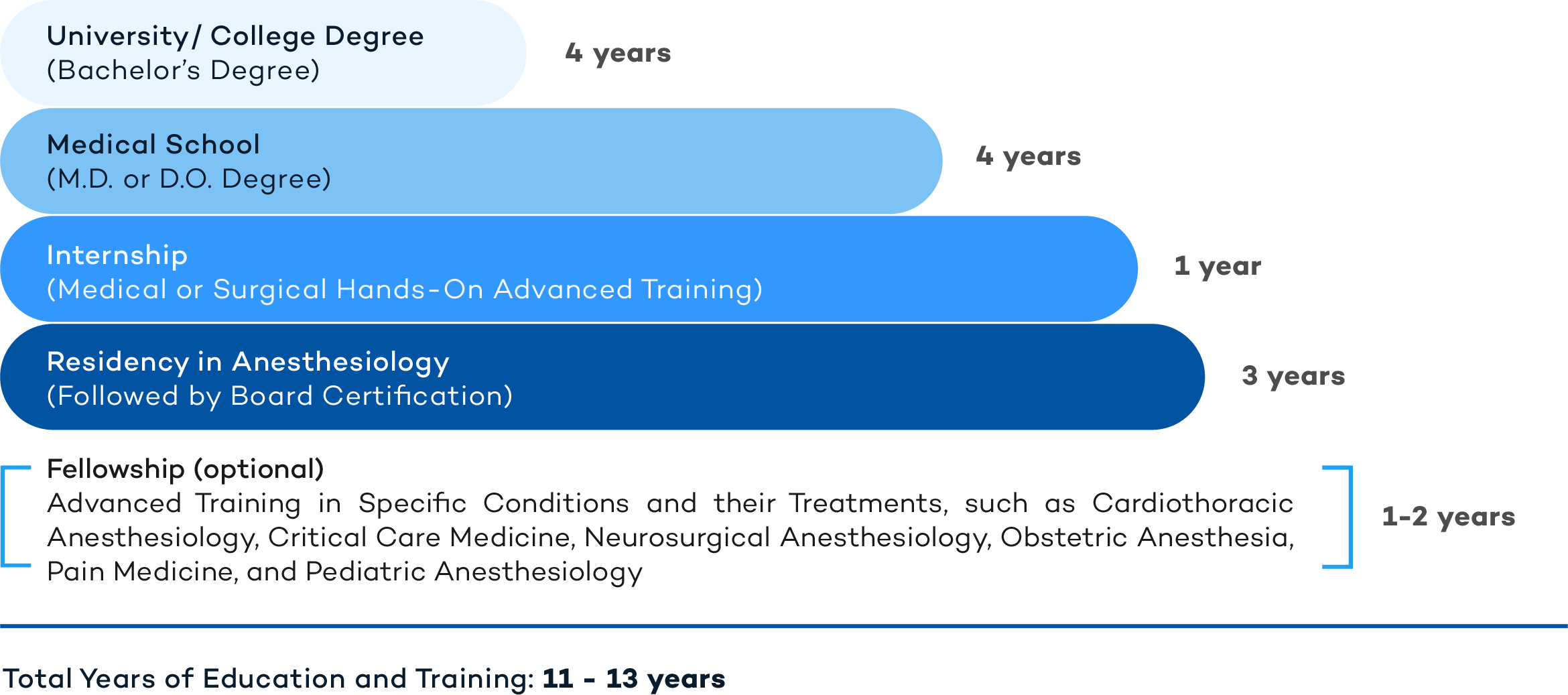

An Anesthesiologist is a Board-Certified Doctor who provides pain relief before, during, and after a surgical procedure. Anesthesiologists help to ensure the safety of patients undergoing surgery. The field of anesthesia encompasses general anesthesia for surgery, regional anesthesia and intravenous sedation, intensive care medicine, and pain management. Anesthesiologists also play key roles in emergency care and trauma, to provide support for airway compromise and circulatory collapse. Anesthesiologists receive advanced training in perioperative care, but some also receive specialized training in fields such as Cardiac Anesthesia, Pediatric or Obstetrics, or Neuro-anesthesia.
When you need the services of an Anesthesiologist for an elective surgical procedure or a major surgery, either your Primary Care Doctor (Internal Medicine. Family Medicine, Pediatrics, or OB/GYN) or the Surgeon performing the procedure will recommend an Anesthesiologist to you. At myDoqter, you have access to patient feedback about doctors, and you can also see the professional recommendations given by other physicians who have witnessed first-hand the expertise and professional competency of your doctor.
Anesthesiologists are doctors (M.D. or D.O.) with advanced medical degrees and training. The following is a representation of the years of education and training that an Anesthesiologist has undergone.

ANESTHESIA from the Greek word ‘anesthesia', which means ‘lack of sensation (to pain)’+ LOGY from the Greek word ‘logia’, which means ‘logic’ or ‘the study of’. Also, the prefix ‘AN’ indicates absence or lack of, and ‘ESTHESIA’ means sensation or feeling, including that of pain.
An Anesthesiologist serves a critical role in administering anesthesia but also managing and treating any changes in critical life functions such as breathing, heart rate, or blood pressure, as each of these may be adversely affected by a surgical procedure.
Anesthesiologists are trained to performed the following procedures:
General Anesthesia: This includes a combination of medications that causes someone to be put into a sleep-like state prior to major surgery. Patients under general anesthesia are completely unconscious and will not be able to feel any pain. Anesthesia can be delivered via a mask or intravenously (through an IV into a vein). While the patient is under the effect of anesthesia, the Anesthesiologist is closely monitoring the body’s major vital signs including blood pressure, heart rate, and breathing to ensure the patient is not in any pain and remains unconscious.
Regional Anesthesia: This is a form of anesthesia that numbs only a portion of the body for pain management prior to a surgical procedure. This type of anesthesia involves the injection of an anesthetic agent near a cluster of nerves that supplies the area of the body to undergo surgery. Spinal anesthesia and epidural anesthesia are the two most common forms of regional anesthesia often given for childbirth or during prostate surgery.
Sedation: Sedation anesthesia, also known as twilight sedation, is used for minor surgical procedures and shorter surgeries. Because of the nature of these surgeries, local anesthesia is insufficient and general anesthesia is seldom necessary. A sedative (calming) agent and an analgesic (numbing) agent are administered together directly into the vein in this form of anesthesia. Sedation anesthesia can be reversed rapidly once the surgery is completed, which offers one of its greatest advantages.
Local Anesthesia: This is a form of anesthesia used to numb a specific area of skin or a part of the body in order to reduce discomfort or pain during minor procedures such as a skin biopsy, a breast biopsy or the suturing of a wound. Local nerve impulses to the brain are temporarily blocked by these analgesics, which are commonly injected directly into the tissue or area of concern. Therefore, pain impulses are not able to be directed to the brain. A common local anesthetic agent is lidocaine.
Nerve Block: This is a specific type of anesthesia whereby an injection of an analgesic is performed around a specific nerve or bundles of nerves, with the resulting loss of feeling or pain. Nerve blocks are commonly used to control pain. Examples of nerve blocks include: during labor and childbirth, to block perioperative pain for joint surgery, to block sciatic nerve pain, for migraines, herniated discs, neck pain, and for hyperhidrosis (excessive sweating).
Pain Management: Many Anesthesiologists specialize in the diagnosis and treatment of pain. Pain may be acute or chronic, or related to underlying malignancy and/or chemotherapy. Pain may be due to a surgery that the patient has had, due to injury or nerve damage, or as a result of certain metabolic diseases such as diabetes mellitus. Pain may also be a primary complaint for a visit to the Pain Management Specialist (Anesthesiologist), without any obvious underlying causes for the pain. The specialists are trained on how to perform certain interventional procedures for pain relief, prescribe pain relief medications, and manage referrals to Physical Therapy, Psychology services or Psychiatry when necessary, in order to alleviate the emotional aspects associated with pain. Pain Management Specialists strive to minimize pain, improve body function, and help patients achieve better overall quality of life.
Critical Care: A Critical Care Anesthesiologist is a highly trained physician who specializes in the management of critically ill patients in an intensive care unit setting. These physicians care for patients who have recently undergone surgery or who suffer from infections or trauma requiring the highest level of health care in the hospital setting. The Critical Care Anesthesiologist takes care of patients that are in an unconscious state who may be on life support and could have multiple organ injuries or organ failure.
Finding the right physician is an important first step to get the right treatment. Anesthesiologists are trained to offer a wide range of treatment options that are tailored to your specific condition. Personalized plans with an Anesthesiologist will help you to manage your illness, pain or surgical journey in the best manner possible.
You can read more about Anesthesiology in the following links:
https://www.asahq.org
https://painmed.org
https://www.asra.com
https://www.iasp-pain.org